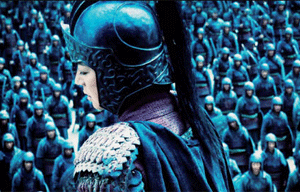Soft power better than hard approach
Updated: 2011-10-28 10:55
By Yang Wenchang (China Daily European Weekly)
|
|||||||||
Global communities have often misunderstood and misinterpreted the diplomatic guideline taoguang yanghui, made popular in China two decades ago by the late leader Deng Xiaoping.
Some commentators have claimed that the idiom implies that China is hiding the shining edge of its sword. Others chose it with expressions like "even 10 years are not late for a gentleman to seek revenge".
"You are hiding your sword's shining sharpness under your table temporarily. When are you going to display it to the United States?" a senior US diplomat recently asked me referring to taoguang yanghui.
Distortions of the term have often projected China as a crouching lion that may strike any time and as an excuse for China-threat propositions. Such misapprehensions are creating an unfriendly and dangerous external environment and imperiling China's diplomatic endeavors.
The origins of the much-maligned phrase can be traced back to ancient China. When prince Xiao Tong of the Southern Dynasty (AD 420-589) first used taoguang, he used it to refer to the sages who shunned public fanfare. The first use of the word yanghui was during the Song Dynasty (960-1279) period for describing self-cultivation for some accomplishment. In later usage up to late Qing Dynasty (1644-1911), either alone or together as an idiom, the expression keeps indicating a low-profile mode of behavior, a kind of cool-headed thinking, intricate planning and hard work.
Capable of being applied to both adverse and victorious circumstances, the term also embraces an inner belief for engaging oneself in unostentatious but diligent efforts and focusing on far-sighted goals for self-motivation.
In the above example it is more of a basic precondition for yousuo zuowei or "trying to amount to something". However, it has nothing to do with statements like "even 10 years is not too late for a gentleman to seek revenge".
When Deng first used taoguang yanghui in the early 1990s to sum up China's strategic thinking in diplomacy, he was asking the diplomats to calm down, observe the global changes attentively and seize their own chances. He was also stressing that China will not "take the lead" or "carry the flag" for a long time to come.
Deng never intended the statement to be a provisional stand or a show of weakness, and he said on innumerable occasions that "China is not afraid of anyone" and "China is not out to make enemies with anyone".
History has already proven that Deng's sharp vision and success have helped China weather many storms and forge a healthy path of development.
However, as China keeps growing, new misinterpretations will occur. Many at home argue that China is no longer as weak as before and so does not need to take things lying down. Their contention is that the current strategy is outdated and needs to be moderated at the very least. Others claim the opposite and feel that a low profile often abdicates the need to act and to do something worthwhile.
The former argument is a partial apprehension at the most. Taoguang yanghui fits not only when one sails against the wind, but also when one touches the wind, not to mention a slew of adversities at present. The latter assumption is wrong as the term itself points to no languishment or inaction, but instead to down-to-earth actions.
In his 2009 address to diplomats, President Hu Jintao said that "insisting on taoguang yanghui and endeavoring to it amount to something". As a dialectical whole that integrates both keeping a low profile and striving for something worthwhile, the guideline is well founded to serve China's diplomatic needs in the new century.
The guideline also matches China's choice of a peaceful development path. Peaceful development is the nature of China, and win-win cooperation, not regional or global hegemony, is the pursuit of the country's opening-up to the outside world.
Achieving long-term goals in a peaceful way requires national power and globally acknowledged moral strength. So the current diplomatic line will lead China onto the moral high ground.
China's low level of development suggests the policy will have to be in place for a long time. Despite becoming the world's second largest economy and having some big global cities, the country is still characterized with a huge population that is poor. The average living standard of the Chinese lags that of many developing nations.
China's leadership has always been clear that the nation is still far from realizing its goals of building a moderately well-off society. That China is and will remain a developing country for quite some time is a solid fact, not the product of self-painted modesty, as some critics have said. Therefore we should continue to adopt the low-key style and work doggedly for our sustainable development.
The nation's leadership has rationally and determinedly defined China as in the primary stage of socialist development. As the key diplomatic guideline tailored for China by Deng Xiaoping and following leaders after absorbing traditional cultural essence and contemporary diplomatic wisdom, taoguang yanghui must be persisted with in China's diplomatic arena throughout the long-term stages.
The author is president of the Chinese People's Institute of Foreign Affairs.











